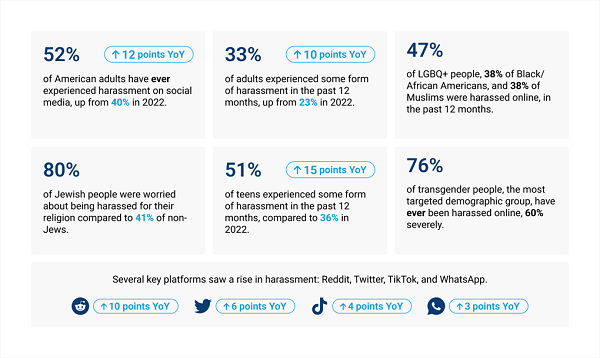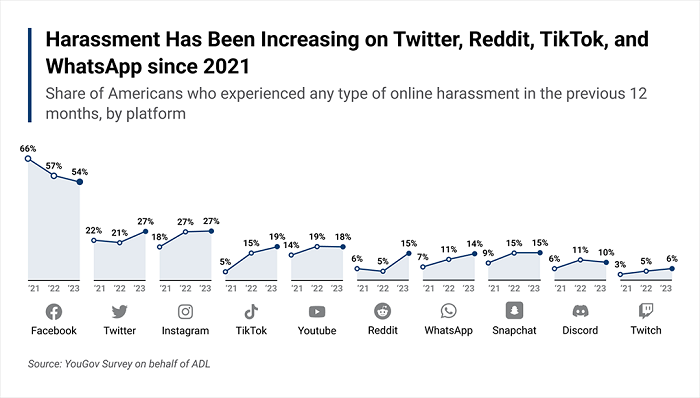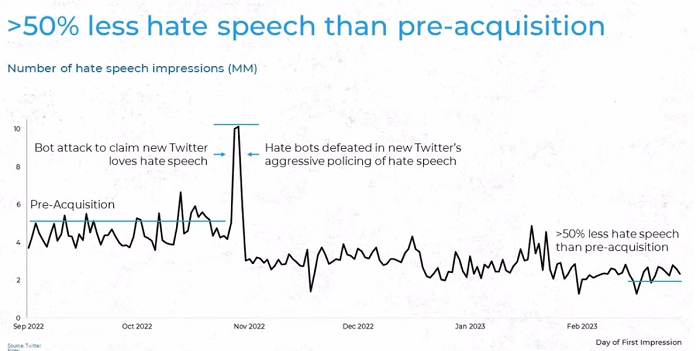One of the key concerns that’s keeping advertisers away from Elon Musk’s Twitter 2.0 is that hate speech is seemingly on the rise at the app, amid various changes to the platform’s policies around abusive content, as it leans into a more free speech-inspired approach to enforcement.
Twitter itself says that it’s doing more than ever to address harmful content and limit its impact, which has led to a significant reduction in exposure to hate speech under Musk’s management. But external reporting hasn’t supported the same, with various third-party analysis suggesting that instances of slurs are on the rise in the app.
And now, another report has highlighted the same, with the Anti-Defamation League finding that hate speech on Twitter is up, year-over-year, with several platforms seeing a rise in abusive language over the past 12 months.
As per the ADL report:
“Over the past year, online hate and harassment rose sharply for adults and teens ages 13-17. Among adults, 52% reported being harassed online in their lifetime, the highest number we have seen in four years, up from 40% in 2022. Both adults and teens also reported being harassed within the past twelve months, up from 23% in 2022 to 33% in 2023 for adults and 36% to 51% for teens. Overall, reports of each type of hate and harassment increased by nearly every measure and within almost every demographic group.”

As you can see in this summary overview, the report, based on a survey of 2,139 US adults, conducted in March this year, found that instances of harassment were up on Reddit, Twitter, TikTok, and WhatsApp specifically, underlining ongoing concerns about behavioral shifts, and each platforms’ capacity to address such.
On Twitter specifically, the report notes that:
“After Elon Musk purchased Twitter and took it private in October 2022, he welcomed back users banned for violating anti-hate policies and dissolved the Trust & Safety Council (of which ADL was a member), a voluntary group of civil society advisors. ADL documented a spike in antisemitism following his takeover in October and has found many of the reinstated accounts spread antisemitism or incite their followers to harassment. Twitter also rolled back rules against anti-transgender hate and, in February, changed its policy of removing violative hateful content to de-amplifying it instead.”
These changes, according to the survey findings, have contributed to an increase in abuse and harassment via tweet – though it is also worth noting that Facebook is where the majority of online harassment still takes place.

So Twitter’s certainly not alone, or necessarily an outlier as such. But it’s notable in the case of Twitter because of the counter claims from Musk and his team, who have repeatedly noted that hate speech is down in the app, even claiming to have implemented a 50% reduction in such back in March.

Elon recently revised that to a 30% shift, as per a TV interview during his recent visit to Europe. But still, the fact that Twitter is reporting a major reduction, and outside analysis is suggesting an increase, is a broad variance, which shows that there’s at least some disconnect in what users are experiencing, and what Twitter is tracking internally.
Or it could come down to the survey pool, and which people each group is talking to. Maybe that’s enough of an explanation for advertisers in considering their ad placement – but the difference in reporting maintains a level of confusion as to what’s actually happening at the app, and how Musk’s changes are impacting the user experience.
In other words, we don’t really know whether Twitter is less brand safe under Elon Musk, but its upcoming collaborations with third-party verification partners could play a key role in reassuring advertisers, and securing more ad spend.



